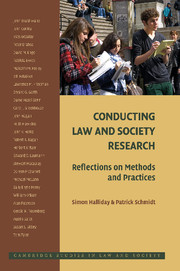Book contents
- Frontmatter
- Contents
- List of Contributors
- Acknowledgments
- 1 Introduction: Beyond Methods – Law and Society in Action
- 2 Stewart Macaulay and “Non-Contractual Relations in Business”
- 3 Robert Kagan and Regulatory Justice
- 4 Malcolm Feeley and The Process Is the Punishment
- 5 Lawrence Friedman and The Roots of Justice
- 6 John Heinz and Edward Laumann and Chicago Lawyers
- 7 Alan Paterson and The Law Lords
- 8 David Engel and “The Oven Bird's Song”
- 9 Keith Hawkins and Environment and Enforcement
- 10 Carol Greenhouse and Praying for Justice
- 11 John Conley and William O'Barr and Rules versus Relationships
- 12 Sally Engle Merry and Getting Justice and Getting Even
- 13 Tom Tyler and Why People Obey the Law
- 14 Doreen McBarnet and “Whiter than White Collar Crime”
- 15 Gerald Rosenberg and The Hollow Hope
- 16 Michael McCann and Rights at Work
- 17 Austin Sarat and William Felstiner and Divorce Lawyers and Their Clients
- 18 Yves Dezalay and Bryant Garth and Dealing in Virtue
- 19 Patricia Ewick and Susan Silbey and The Common Place of Law
- 20 Hazel Genn and Paths to Justice
- 21 John Braithwaite and Peter Drahos and Global Business Regulation
- 22 John Hagan and Justice in the Balkans
- 23 Conclusion: “Research Is a Messy Business” – An Archeology of the Craft of Sociolegal Research
- Index
- Cambridge Studies in Social and Cultural Anthropology
16 - Michael McCann and Rights at Work
Published online by Cambridge University Press: 09 February 2010
- Frontmatter
- Contents
- List of Contributors
- Acknowledgments
- 1 Introduction: Beyond Methods – Law and Society in Action
- 2 Stewart Macaulay and “Non-Contractual Relations in Business”
- 3 Robert Kagan and Regulatory Justice
- 4 Malcolm Feeley and The Process Is the Punishment
- 5 Lawrence Friedman and The Roots of Justice
- 6 John Heinz and Edward Laumann and Chicago Lawyers
- 7 Alan Paterson and The Law Lords
- 8 David Engel and “The Oven Bird's Song”
- 9 Keith Hawkins and Environment and Enforcement
- 10 Carol Greenhouse and Praying for Justice
- 11 John Conley and William O'Barr and Rules versus Relationships
- 12 Sally Engle Merry and Getting Justice and Getting Even
- 13 Tom Tyler and Why People Obey the Law
- 14 Doreen McBarnet and “Whiter than White Collar Crime”
- 15 Gerald Rosenberg and The Hollow Hope
- 16 Michael McCann and Rights at Work
- 17 Austin Sarat and William Felstiner and Divorce Lawyers and Their Clients
- 18 Yves Dezalay and Bryant Garth and Dealing in Virtue
- 19 Patricia Ewick and Susan Silbey and The Common Place of Law
- 20 Hazel Genn and Paths to Justice
- 21 John Braithwaite and Peter Drahos and Global Business Regulation
- 22 John Hagan and Justice in the Balkans
- 23 Conclusion: “Research Is a Messy Business” – An Archeology of the Craft of Sociolegal Research
- Index
- Cambridge Studies in Social and Cultural Anthropology
Summary
Law and Society research, born in the 1960s and a successor to legal realism, has roots in a tradition of “engaged” scholarship, connected to progressive politics and the concerns of marginalized people. But with one foot in the social sciences, there remain disagreements about the position scholars should have in the field, either in advocating for change or living lives of engagement. Certainly, explicit political commitments can complicate research in a number of ways, such as through bias that can affect the questions asked or the answers reached. On the other hand, political commitments can strengthen the researcher's position, providing enthusiasm, energy, and access.
Michael McCann's research into pay equity mobilization and litigation brought him to the heart of that problem. By his choice of topics, Rights at Work reflects his prior investment in union politics. Once in the field, he was drawn into a more active role than most textbooks on research methods – imparting a veneer of neutrality – describe. Yet the sympathetic academic does not have an uncontested position. In this interview McCann reflects on how race and gender affected his interactions with his research subjects and with the way he framed the project as a whole. Unavoidably we must ask how the identity of the researcher might affect research projects such as this.
Even further, it invites the question of what it means to be an academic, not only as those in higher education define themselves but in what the people who are research subjects expect and ask of researchers.
- Type
- Chapter
- Information
- Conducting Law and Society ResearchReflections on Methods and Practices, pp. 174 - 186Publisher: Cambridge University PressPrint publication year: 2009



